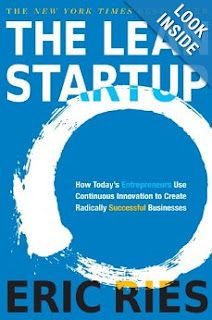Well, like many questions, the answer is "It Depends." It depends on whether your business is a B2B or B2C business. It depends on which metrics are important to your business. It depends on whether you have enough monitoring in place to capture what is important to gain the insights your data can reveal.
 The role of business intelligence is not to just collect metrics on everything, but to give you feedback on things that you can control to improve the flow of products or services to your end customer. As Eric Reis said in his book, "The Lean Startup", "If you want to see what happens, you will always succeed at seeing what happens."
The role of business intelligence is not to just collect metrics on everything, but to give you feedback on things that you can control to improve the flow of products or services to your end customer. As Eric Reis said in his book, "The Lean Startup", "If you want to see what happens, you will always succeed at seeing what happens."By determining what metrics are important to drive your business, a dashboard or balanced scorecard approach you can execute designed experiments with certain measurable results, giving you the knowledge that whatever you are doing is succeeding or failing at meeting your designed experiment requirements. It can also give you immediate feedback to one or more failures to which you can give immediate attention, allowing you to manage by exception, instead of manage by rule.
For the Business to Consumer (B2C) business, the first opportunity to capture data for your intelligence needs can be at the cash register. Of course, a simple cash register is not a data collection tool, but it could be. Electronic cash registers or Point of Sale (POS) systems can give you immediate access to intelligence you could only dream about with a mechanical cash register.
For starters, most POS systems can provide inventory management capabilities, transaction management, employee management, and enable multiple payment methods. With all Point of Sale systems, payment gateway integration with a merchant services account will have built in reporting and business intelligence tools to help you better manage your business.
In one example, published by ShopKeep POS, one shop owner discovered that one product category that took up 25% of her floor space was responsible for 75% of all sales in her men's clothing section. This kind of information can help you decide if you need to expand or shrink your in store floor or shelf space for a given product or product category. This would not have been visible without a business intelligence capability built into the transaction.
In another example, a shop owner can leverage their payment management system to track purchasing habits of all customers who participate in a loyalty program. Loyalty programs are great for building a loyal following and encouraging repeat business, but also in the types of intelligence you gain from the range of customers throughout your transaction. A business can expand its loyalty program by offering gift cards that can also be tracked to customer loyalty data and growth as gift cards are promoted to new customers by existing ones. The data gained from loyalty analysis can help your business determine marketing strategies and again is a low cost
Merchant Service data can be a wealth of business intelligence data at no more cost to collect than having the right merchant services partner, like Mercury Payment Systems or Payment Revolution.
Upgrading an existing business with little to no data capture doesn't have to be intimidating and with the right local partner, can be implemented quickly and reliably to provide the maximum benefit in a short period of time.
For the Business to Business (B2B) organization, such as those involved in either the manufacture, transport and/or sales of goods, business intelligence data may be plentiful, but disconnected. Your business may have the resources to perform its own intelligence collection processes, or hire from a local firm to collect disconnected data sources, or implement new data collection sources to a centralized reporting database.
Data capture from automation controls in your factory floor or checkpoints in a workflow can be easy sources of immediate feedback or summary intelligence. Your business may have multiple business intelligence needs, so your intelligence reporting system should be flexible enough to account for multiple data sources including SalesForce.com, QuickBooks, Dynamics, and automation equipment.
Collecting data has become easier for businesses at all levels to do and at price points that every business can afford.
Robert is the owner of Lean Start-up Services, www.leanstartupservices.com, providing business intelligence, process improvement, and office management systems to local SMBs in the greater Palm Bay/Melbourne Florida area. For more information about any of the products or services mentioned in this article, email Robert at robert@leanstartupservices.com

No comments:
Post a Comment